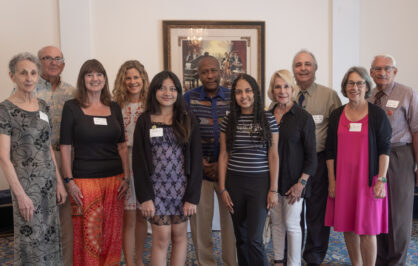
Grants & Scholarships
Working as one for educational justice
School had ended and the day was much warmer than others, but OurSchoolsPVD students were focused on an appeal that has been made repeatedly since at least 2018 – to require and teach ethnic studies in Rhode Island public schools.
Should they leverage the fact that the State General Assembly already passed legislation mandating all public elementary and secondary schools to teach Asian American, Native Hawaiian, and Pacific Islander history and culture?
Perhaps they can demonstrate how best to implement this diverse curriculum and eliminate any excuses the adult decision makers might use to further delay its adoption. Decision makers asked that exact question and others in a recent meeting.
“Apparently, these decision makers don’t know what they are doing so we need to answer these questions for them,” Ailani Reed, a Classical High School senior, said to the more than 25 students strategizing together. “Is it not their job to answer these questions?”
“Regardless,” she added, “I care more about them not saying no.”

OurSchoolsPVD (OSPVD) is an alliance of youth-led grassroots organizations – primarily the Alliance of Rhode Island Southeast Asians for Education (ARISE), Providence Youth Student Movement (PrYSM), Youth In Action (YIA), and Young Voices (YV) – and their allies working as one for education justice in Providence, and beyond. The RI Center for Justice (CFJ) aids with legal assistance and additional support, and the Center for Youth & Community Leadership in Education (CYCLE) at Roger Williams University is the alliance’s administrative backbone, anchor organization, and home to its staff.
CYCLE believes “building the schools our communities deserve requires collective power derived from shared leadership and trusting relationships between youth, families, and educators.” Its leaders also agree educational justice only occurs if the needs, vision, and influence of those most impacted by the lack of democracy, dollars, and dignity in our current public education system — such as youth and families of color and those from low-income communities – are prioritized.
Because of those core values, a Youth Leaders Cohort made up of representatives from OSPVD is the campaign leadership and decision-making group for the alliance. The adults only support.
“When I am looking at OSPVD’s ethnic studies focus from more of a distant perch, these demands, the things they are naming, yeah they are about ethnic studies, but they are also about so much more,” said CYCLE Executive Director Keith Catone. “They want teachers who look like them. They want schools that reflect who they are and where they are from, and they want voice.”
With an emphasis on advocacy and equity, the Rhode Island Foundation provides grant funding to CYCLE and is also a funder to many youth-led organizations. Support for ARISE, began in 2017 with a strategic initiative grant for a “math through the lens of social justice” program, and just last year, ARISE was one of several recipients of a $50,000 investment from the Foundation in the form of a designated endowment fund, established for the benefit of the organization.
ARISE contracted with the Providence School department six years ago to pilot a six to eight week condensed ethnic studies curriculum, particularly focused on the impact of the Vietnam War on Southeast Asians, at Dr. Jorge Alvarez High School. The organization also teaches ethnic studies as well as an ‘owning our identity’ program to high schoolers and middle school students, every summer for free.
It’s a curriculum OSPVD says is desperately needed both statewide and nationwide. They collectively agree that the history currently taught in public schools does not expand much past Eurocentric points of view, nor does the “just dates and facts memorization” style of teaching allow for much discussion and critical thinking.
On that day of strategizing together, the young OSPVD leaders then shifted focus from increasing exposure and getting supporters on record about how to implement ethnic studies curriculum to consider other questions – such as who trains the trainer, how to connect this curriculum to advanced placement (AP) work, and how would this educational requirement explicitly connect to curriculum standards?

The students then split into pods, or smaller groups, to organize, empower, and support one another. Pod 4 had students of diverse races from multiple grades and high schools. One of the youngest, Adriana Phomvihane, a Providence Career and Technical Academy freshman, said she joined this year because “we should know our history.”
The ideas and strategies of everyone were numerous.
“For our next action,” said Cayden Arana, Classical High School senior, who reported out for his group, “we need to keep it clear and concise. We need to stay on topic and be specific.”
Another young strategist suggested expanding the audience by inviting more teachers and school workers to the table.
Yet another said put more pressure on those in power with student testimonies.
With so many years dedicated to the same fight, Angel Solis, a Central High School senior, said, “At this point, urgency is needed. Pressure is needed.”

In April, a non-binding resolution was passed unanimously by the Providence school board calling for the creation of a year-long ethnic studies course, which will be implemented as a social studies credit for graduation in 2026. The resolution also requires the establishment of an Ethnic Studies Leadership Council, allowing students to take leadership roles in designing curriculum.



